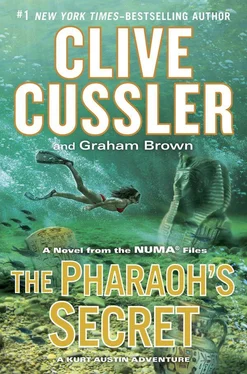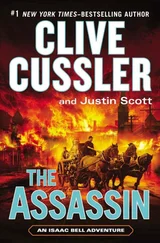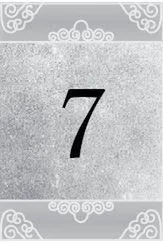Clive Cussler, Graham Brown
The Pharaoh's Secret
Prologue
CITY OF THE DEAD
Abydos, Egypt
1353 B.C., the seventeenth year of Pharaoh Akhenaten’s reign
The full moon cast a blue glow across the sands of Egypt, painting the dunes the color of snow and the abandoned temples of Abydos in shades of alabaster and bone. Shadows moved beneath this stark illumination as a procession of intruders crept through the City of the Dead.
They traveled at a somber pace, thirty men and women, their faces covered by the hoods of oversize robes, their eyes locked on the path before them. They passed the burial chambers containing the pharaohs of the First Dynasty and the shrines and monuments built in the Second Age to honor the gods.
At a dusty intersection, where the drifting sand covered the stone causeway, the procession came to a silent halt. Their leader, Manu-hotep, gazed into the darkness, cocking his head to listen and tightening his grip on a spear.
“Did you hear something?” a woman asked, easing up beside him.
The woman was his wife. Behind them trailed several other families and a dozen servants carrying stretchers that bore the bodies of each family’s children. All cut down by the same mysterious disease.
“Voices,” Manu-hotep said. “Whispers.”
“But the city is abandoned,” she said. “To enter the necropolis has been made a crime by Pharaoh’s decree. Even we risk death to set foot on this ground.”
He pulled back the hood of his cloak, revealing a shaven head and a golden necklace that marked him as a member of Akhenaten’s court. “No one is more aware of that than I.”
For centuries, Abydos, the City of the Dead, had thrived, populated by priests and acolytes of Osiris, ruler of the afterlife and the god of fertility. The pharaohs of the earliest dynasty were buried here, and though more recent kings had been buried elsewhere, they still constructed temples and monuments to honor Osiris. All except Akhenaten.
Shortly after becoming pharaoh, Akhenaten had done the unthinkable: he’d rejected the old gods, minimizing them by decree and then overthrowing them, casting the Egyptian pantheon down into the dust and replacing it with the worship of a single god of his choosing: Aten, the Sun God.
Because of this, the City of the Dead was abandoned, the priests and worshippers long gone. Anyone caught within its borders was to be executed. For a member of Pharaoh’s court like Manu-hotep, the punishment would be worse: unrelenting torture until they prayed and begged to be killed.
Before Manu-hotep could speak again, he sensed movement. A trio of men came racing from the dark, weapons in hand.
Manu-hotep pushed his wife back into the shadows and lunged with his spear. It caught the lead man in the chest, impaling him and stopping him cold, but the second man stabbed at Manu-hotep with a bronze dagger.
Twisting to avoid the blow, Manu-hotep fell to the ground. He pulled his spear free and slashed at the second assailant. He missed, but the man stepped backward and the tip of a second spear came through his back and protruded from his stomach as one of the servants joined the fight. The wounded man crumpled to his knees, gasping for air and unable to cry out. By the time he fell over, the third assailant was running for his life.
Manu-hotep rose up and flung his spear with a powerful twist of his body. It missed by inches and the fleeing target disappeared into the night.
“Grave robbers?” someone asked.
“Or spies,” Manu-hotep said. “I’ve felt as if we were being followed for days. We need to hurry. If he gets word to Pharaoh, we won’t live to see the morning.”
“Perhaps we should leave,” his wife urged. “Perhaps this is a mistake.”
“Following Akhenaten was the mistake,” Manu-hotep said. “The Pharaoh is a heretic. Because we stood with him, Osiris punishes us. Surely you’ve noticed that only our children fall asleep, never to wake; only our cattle lie dead in the fields. We must beg Osiris for mercy. And we must do it now.”
As Manu-hotep spoke, his determination grew. During the long years of Akhenaten’s reign, all resistance had been crushed by force of arms, but the gods had begun taking revenge of their own and those who stood with Pharaoh were suffering the worst.
“This way,” Manu-hotep said.
They continued deeper into the quiet city and soon arrived at the largest building in the necropolis, the Temple of Osiris.
Broad and flat-roofed, it was surrounded by tall columns sprouting from huge blocks of granite. A great ramp led up to a platform of exquisitely carved stone. Red marble from Ethiopia, granite infused with blue lapis from Persia. At the front of the temple stood a pair of mammoth bronze doors.
Manu-hotep reached them and pulled the doors open with surprising ease. The smell of incense wafted forth, and the sight of fire in front of the altar and torches on the walls surprised him. The flickering light revealed benches arranged in a semicircle. Dead men, women and children lay upon them, surrounded by members of their own families and the muted sounds of quiet sobbing and whispered prayers.
“It appears we’re not the only ones to break Akhenaten’s decree,” Manu-hotep said.
Those inside the temple looked at him, but otherwise they didn’t react.
“Quickly,” he said to his servants.
They filed in, placing the children’s bodies where they could find space as Manu-hotep approached the great altar of Osiris. There, he knelt, head down beside the fire, bowing in supplication. He withdrew from his robe two ostrich feathers.
“Great Lord of the Dead, we come to you in suffering,” he whispered. “Our families have fallen to the affliction. Our houses have been cursed, our lands have turned to worthless chaff. We ask that you take our dead and bless them in the afterlife. You who control the Gates of Death, you who command the rebirth of the grain from the fallen seed, we beseech you: send life back to our lands and homes.”
He placed the feathers down reverently, sprinkled a mixture of silica and gold dust across them and stepped back from the altar.
A gust of wind blew through the chamber, drawing the flames to one side. A resounding boom followed and echoed throughout the hall.
Manu-hotep spun just in time to see the huge doors at the far end of the temple slam shut. He looked around nervously as the torches on the wall flickered, threatening to go out. But they stayed lit and the flames soon straightened and burned brightly once again. In the restored light, he saw the shape of several figures behind the altar where no one had been standing just moments before.
Four of them were dressed in black and gold — priests of the Osiris cult. The fifth was clothed differently, as if he were the Lord of the Underworld himself. The fabric used to mummify the dead had been wrapped around his legs and waist. Bracelets and a necklace of gold contrasted with his greenish-tinted skin, while a crown replete with ostrich feathers adorned his head.
In one hand this figure held a shepherd’s crook, in the other a golden flail, meant to thrash the wheat and separate the living grain from the dead husk. “I am the messenger of Osiris,” this priest said. “The avatar of the Great Lord of the Afterlife.”
The voice was deep and resonant and almost otherworldly in its tone. Everyone in the temple bowed and the priests on either side of this central figure proceeded forth. They walked around the dead scattering leaves, flower petals and what looked to Manu-hotep like dried skin from reptiles and amphibians.
“You seek the comfort of Osiris,” the avatar said.
“My children are dead,” Manu-hotep replied. “I seek favor for them in the afterlife.”
Читать дальше












